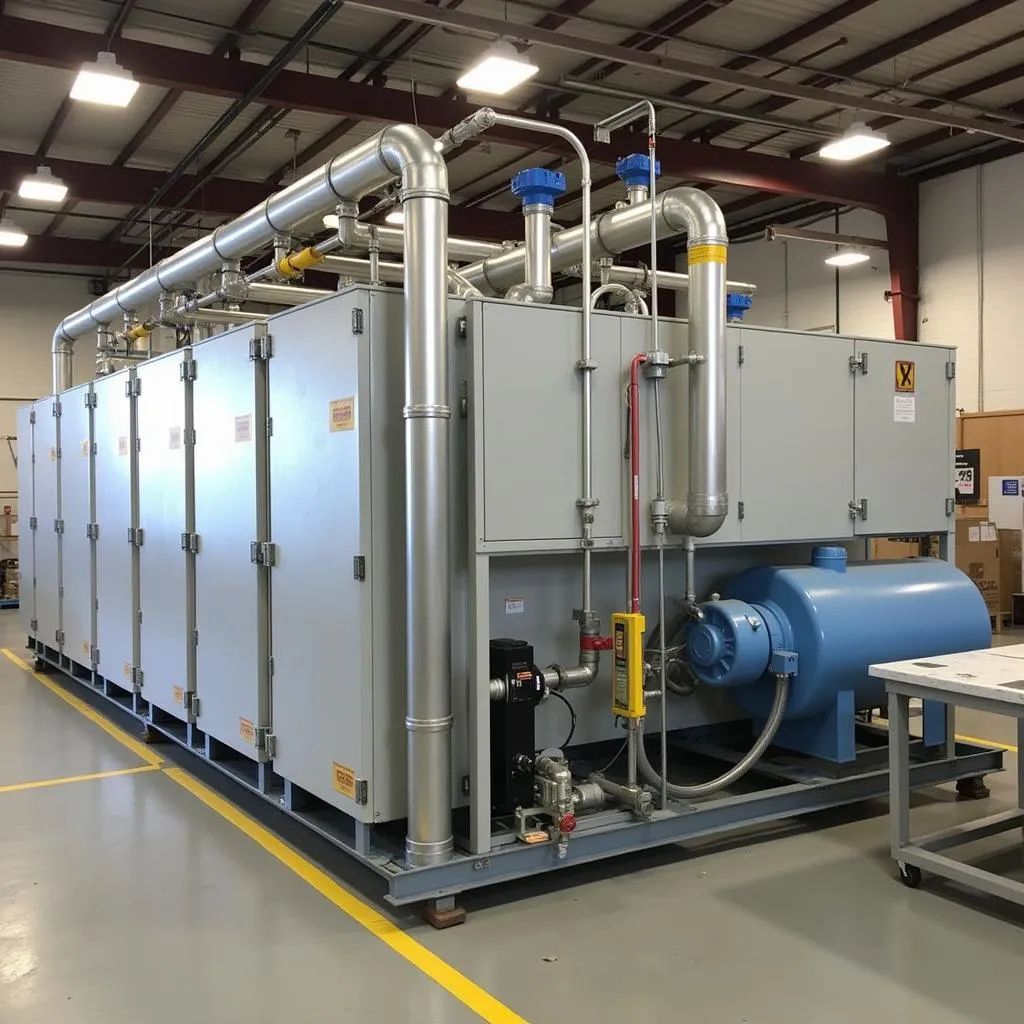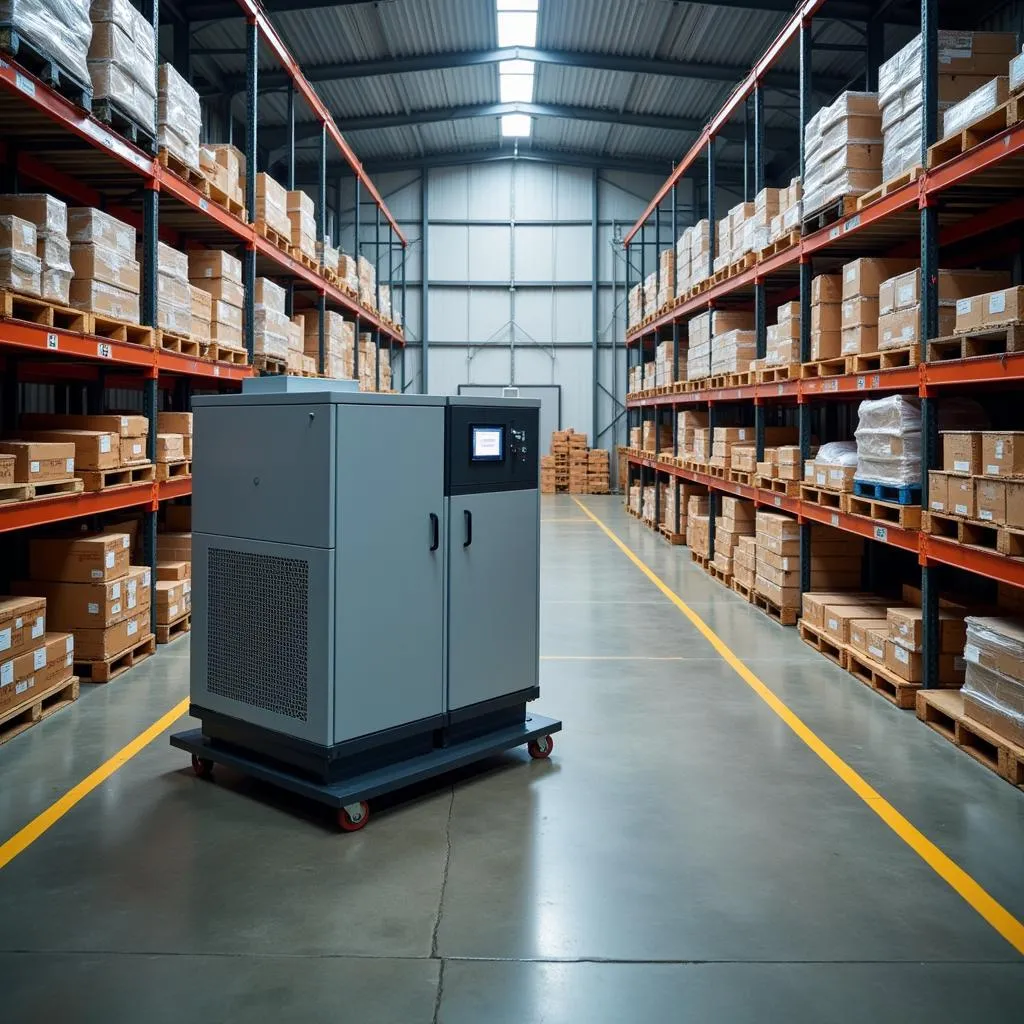The food industry is a complex ecosystem of production, processing, packaging, and storage, all demanding precise environmental control. One aspect often overlooked but critical for success is Food Industry Dehumidification. Maintaining optimal humidity levels isn’t just about comfort—it’s crucial for preventing spoilage, maintaining product quality, and ensuring a safe and hygienic environment.
 Food Factory Dehumidification System
Food Factory Dehumidification System
Why is Humidity Control Vital in Food Production?
Fluctuating humidity levels can spell disaster for food products. High humidity creates a breeding ground for bacteria, mold, and mildew, leading to costly spoilage and potential health hazards. It can also impact the texture of dry ingredients, causing clumping, caking, and compromising their quality. Conversely, extremely low humidity can lead to moisture loss in certain foods, affecting taste, appearance, and shelf life.
 Food Products Damaged by Humidity
Food Products Damaged by Humidity
Benefits of Dehumidification in the Food Industry
Investing in a robust dehumidification system provides numerous benefits for food businesses of all sizes:
- Prevents Mold and Microbial Growth: By controlling humidity, you inhibit the growth of harmful microorganisms that can spoil food and pose health risks.
- Maintains Product Quality: Consistent humidity levels preserve the texture, flavor, and appearance of food products, ensuring they meet consumer expectations.
- Extends Shelf Life: Dehumidification helps to slow down the deterioration process, extending the shelf life of perishable goods and reducing waste.
- Improves Hygiene: A drier environment discourages pest infestations, contributing to a cleaner and more hygienic production space.
- Protects Equipment: Dehumidification prevents corrosion of machinery and equipment, ensuring their longevity and reducing maintenance costs.
Dehumidification Solutions for Every Stage of Food Production
Different stages of the food production cycle require tailored dehumidification solutions:
1. Processing and Manufacturing:
- Large-scale industrial dehumidifiers are essential for maintaining optimal humidity during processing, packaging, and storage.
- These units are designed to handle high air volumes and provide precise humidity control, even in challenging environments.
2. Storage Warehouses:
- Proper ventilation and strategically placed dehumidifiers prevent condensation build-up and protect stored ingredients and finished products from moisture damage.
3. Cold Storage Facilities:
- Specialized dehumidifiers designed for low-temperature applications are crucial for preventing frost and ice formation, ensuring the efficacy of refrigeration systems, and maintaining the quality of perishable goods.
 Industrial Dehumidifier in Food Storage
Industrial Dehumidifier in Food Storage
Choosing the Right Dehumidifier for Your Needs
Selecting the appropriate dehumidifier depends on several factors, including the size of your facility, specific production processes, and required humidity levels. Consulting with a specialized HVAC company experienced in food industry applications is crucial for determining the most effective and energy-efficient solution.
Beyond Dehumidification: A Holistic Approach
While dehumidification is a cornerstone of food safety and quality, it’s most effective when integrated into a comprehensive environmental control strategy. This includes:
- Proper Ventilation: Adequate airflow helps to remove excess moisture and prevent stagnant air pockets where mold can thrive.
- Temperature Control: Maintaining optimal temperatures in conjunction with humidity control further inhibits microbial growth and preserves product quality.
- Regular Cleaning and Sanitation: Implementing strict hygiene protocols alongside environmental controls ensures a safe and sanitary food production environment.
Dehumidification: An Investment in Quality and Safety
Investing in food industry dehumidification is an investment in the longevity and success of your business. By prioritizing humidity control, you’re not just protecting your products and profits—you’re demonstrating a commitment to providing safe, high-quality food products to your consumers.
FAQs about Dehumidification in the Food Industry
1. How do I know if my facility needs a dehumidifier?
Signs of high humidity include condensation on windows and walls, musty odors, and visible mold growth. Regularly monitoring humidity levels is recommended.
2. What is the ideal humidity level for food storage?
The optimal humidity level varies depending on the specific food product. However, a relative humidity range of 50-60% is generally recommended for most food storage areas.
3. How much does a dehumidification system cost?
Costs vary based on the size and complexity of the system. However, dehumidification should be viewed as an investment that yields long-term returns in terms of reduced spoilage, improved product quality, and enhanced safety.
4. Can I install a dehumidification system myself?
While some smaller units may be suitable for DIY installation, it’s generally recommended to consult with qualified HVAC professionals for larger systems or complex installations.
5. How often do dehumidifiers require maintenance?
Regular maintenance, including filter cleaning or replacement, is essential for optimal performance and longevity. Consult the manufacturer’s recommendations for specific maintenance guidelines.
Need assistance with your food industry dehumidification needs? Contact Mina Cones Food at Phone Number: 02437655121, Email: minacones@gmail.com or visit us at 3PGH+8R9, ĐT70A, thôn Trung, Bắc Từ Liêm, Hà Nội, Việt Nam. Our dedicated team is available 24/7 to assist you.